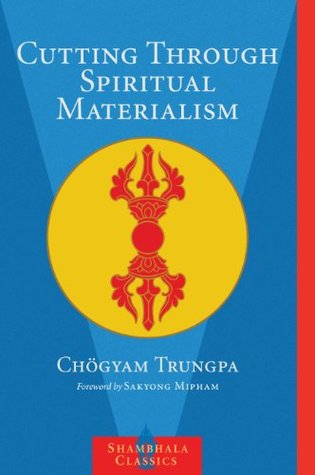More on this book
Community
Kindle Notes & Highlights
we are always trying to fill the gap, to make things right, to find that extra bit of pleasure or security.
We tend to live in the future, our view of life colored by the expectation of achieving an ideal goal.
We are fascinated, blinded, and overwhelmed by the idealized goal.
You push yourself in that direction, regardless of whether or not you are able to achieve it. This approach creates a kind of blindfold,
We want to escape. We want to run away from pain rather than regard it as a source of inspiration.
It is too embarrassing to look into it. This is the attitude of paranoia: if you look too closely, you will find something fearful.
Opening to oneself fully is opening to the world.
mahavipashyana
awareness of the overall pattern rather than the focusing of attention upon details.
The mahayana scriptures speak of those who are
completely ready to open, those who are just about ready to open, and those who have the potential to open.
Tathagata means “those who have experienced the tathata,” which is, “as it
is”:
six transcendental activities which take place spontaneously. They are: transcendental generosity, discipline, patience, energy, meditation, and knowledge.
“the six paramitas,”
Paramita means “arriving at the other side or shore,”
Generosity is
not being afraid to receive anything.
So transcendental generosity is giving whatever you have.
act according to openness, will not have to follow rules; he will simply fall into patterns.
Transcendental patience never expects anything. Not expecting anything, we do not get impatient.
The more we push forward, the more we will be pushed back, because impulse is such a strong driving force
without wisdom.
Patience also feels space. It never fears new situations,
Once one is aware of the space between the situation and oneself, then anything can happen in that space.
we are completely open, fully awake to life, there is never a dull moment. This is virya.
panoramic awareness.
“knowledge.”
the five paramitas are like five rivers flowing into the ocean of prajna.
prajna is the intelligence, the basic pattern into which all these other virtues lead and dissolve.
The bodhisattva path is divided into ten stages and five paths.
shunyata—nothingness, emptiness, voidness, the absence of duality and conceptualization.
Form is that which is before we project our concepts onto it. It is the original state of “what is here,”
Form is empty of our preconceptions, empty of our judgments.
To try to see these things as empty is also to clothe them in concept.
looking for beauty or philosophical meaning to life is merely a way of justifying ourselves,
shunyata in this case is the complete absence of concepts or filters of any kind,
It is a question of seeing the world in a direct way without desiring “higher” consciousness
there was still an experience and an experiencer.
If we see things as they are, then we do not have to interpret or analyze them further;
it is dubious that one can even speak of “experiencing” reality, since this would imply a separation
between the experiencer and the experience.
whether one can even speak of “reality” because this would imply the existence of some objective knower...
This highlight has been truncated due to consecutive passage length restrictions.
the eternalists, the nihilists, and the atomists.
three “misconceptions of the nature of reality”
eternalism,
Things are born and die, yet they contain an essence which does not perish.
the holders of this doctrine usually subscribe to belief in God,
something solid to hang on
nihilism.


